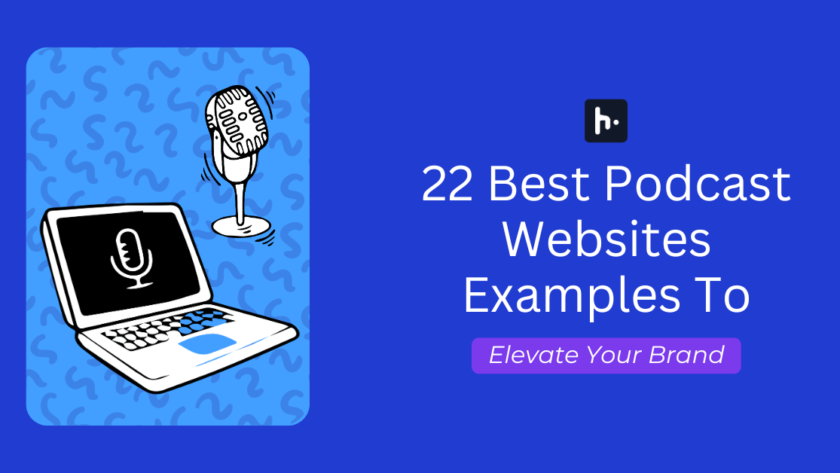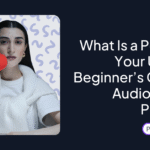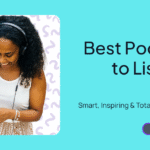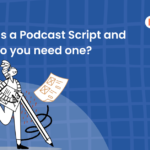“We’re interested in sponsoring your podcast, it aligns with our brand and we’d get meaningful engagement from your audience. Can you forward your podcast website for us to look at?” This is great news for any podcaster, however, when it comes to podcast websites? Not many podcasters have it.
How does one get a podcast website up and running within minutes? We’ve gathered 22 best podcast websites for inspiration that you can click here to see. We’ve also explained why you need one (apart from sending it to your sponsors), and how you can make one. Let’s go!
Why Do I Need A Podcast Website?
Remember the days of visiting cards? If you’re too young you might not, but the millennials will get what I am referring to. Visiting cards were a small card with your name, your designation, contact details and your services. They were exchanged to retain information of people you meet and contact them later.
That’s exactly what a podcast website is for a podcaster. It contains all your information, your social media channels, email to contact you and any other links you want to have (it can be your community’s link as well). Ideally, all your episodes and any other podcasts you have should be on one website to be all in one-place to access.
So whenever you want to redirect people to know more about your podcast, you can then direct them to your podcast website and that will act as the hub of all your podcast and its information.
Some people who might ask for your website are:
- Sponsors
- Podcast Guests
- New Listeners
- Friends and Family
Another advantage of podcasters having podcast websites is the SEO benefit. With a well optimized name and website, you can reap the benefits of people searching for your niche and topics, and stumbling on your website.
Moreover as a personal brand, it becomes imperative to position yourself professionally and have a clean looking website with all the essentials in place. It amps up your brand and makes you look put together.
Podcast Websites Tools To Try
There are many podcast websites tools in the market that help you make a website easily. Here are some of the top picks:
Hubhopper: As a podcasting software to host, distribute, and manage your podcast, it not only hosts your podcast but also creates a website for your podcast in less than 3 minutes. You get the option to customize your theme, theme color, sub domain, favicon, fonts, add your podcasts, and give you the ability to change the content around.
The episode player is built-into the website and your website gets auto-updated when you release a new episode. The best part? You don’t require any coding whatsoever. Try it out today, start your free 7-day free trial.
Podcastpage.io: Podcast Page is another great option you can explore. It is also built specifically for podcasts, and has an easy interface to use. You again don’t need coding to build a website. You can just use the templates they have available to make your website. It is specifically made just to build podcast websites.
WordPress: WordPress is a very popular platform to build websites with a lot of functionality, one of which is creating a website for your podcast. The learning curve is a bit steep but once you figure it out, it is simple to manage your website. You also get access to multiple themes to choose from so instead of designing it from scratch, you can pick a theme that suits your brand and continue.
Wix: Wix is another drag and drop website builder that you can use to build your website as well. They have multiple options for you to choose from and makes it very easy to get a website up and running.
Squarespace: Similar to Wix, Squarespace also has an always to use interface and drag and drop facility to make your website.
Hostinger: Hostinger is another great option since you get both hosting and your domain name from one place as well as website building capability.
How To Make A Website For Podcasts?
You can easily make a podcast website with Hubhopper’s Microsite Feature. Here is a step by step process of how to make a website for podcast:
Step 1: Customize your website design
During this stage you decide the look and feel of your website. Select between a light and dark theme. Personalize your website based on your podcast’s colors. You can also pick a color from your cover art to bring cohesion. You can also choose the title and heading font to give your website more character.
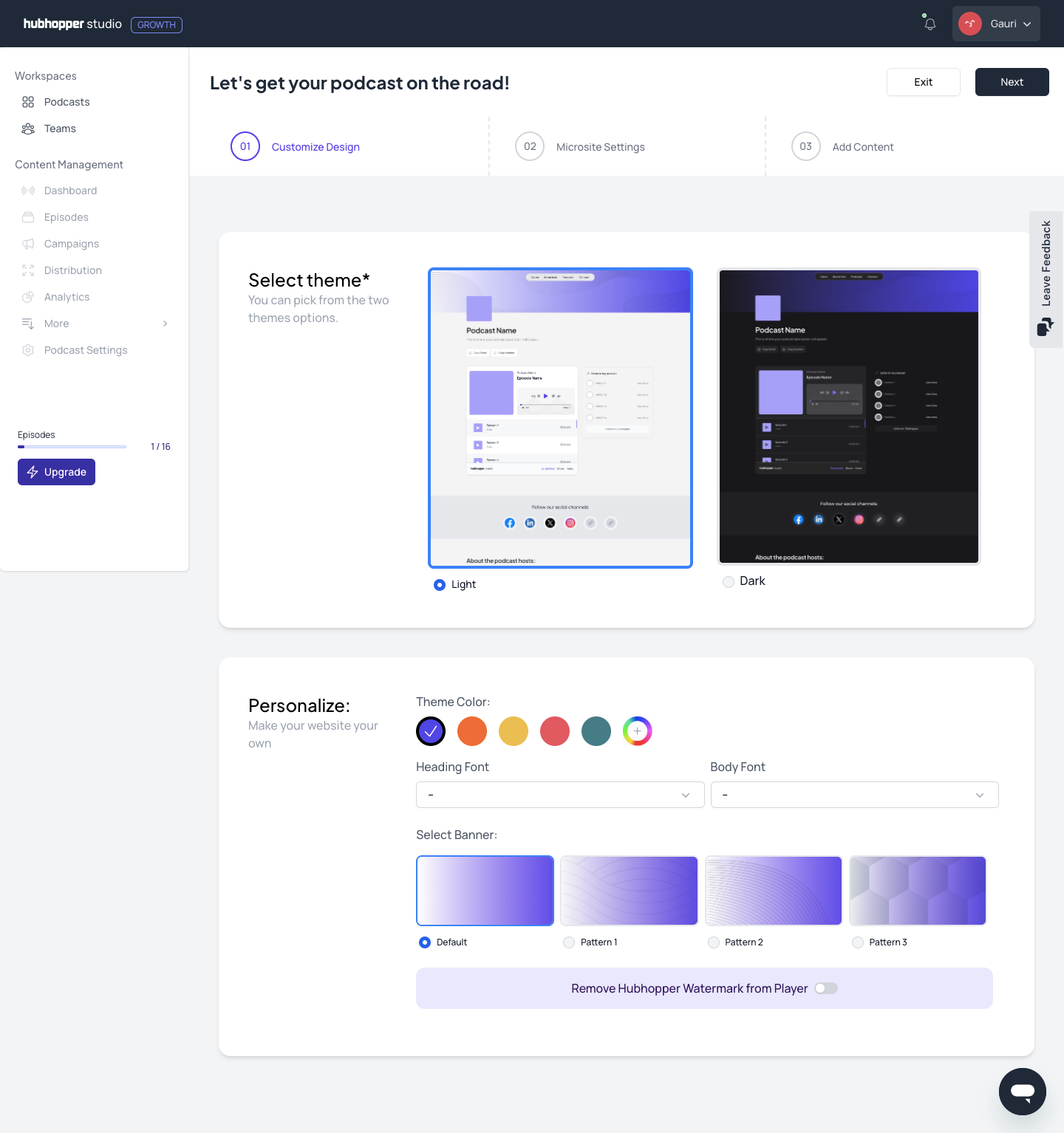
Step 2: Microsite Settings
Here’s where you add the nitty gritties of your microsite – the technical details of your website. You can select a custom subdomain and even the hosting which is absolutely free. It is included in your plan and therefore there are no additional charges.
You can also select a favicon and we recommend it to be 32×32 px. You can also choose if you want to add all your podcasts (since Hubhopper lets you host unlimited podcasts) or choose the podcasts you want to add.

Step 3: Add Content
This is where you can add a bit about yourself, add your image to show the face behind the podcast. Remember, the host image should be 1400 x 1400 px. And you can also add all your social links and any other platform links. We’d suggest adding your patronage platform (Patreon/Pabbly) links, or your community (Discord, WhatsApp, Telegram, etc.) links.
You can also add a contact form in your website, to enable direct communication with you. Whenever someone fills the form successfully, you will receive the information on your email address. That way, you can receive instant updates of any query or feedback from your listeners or potential sponsors.
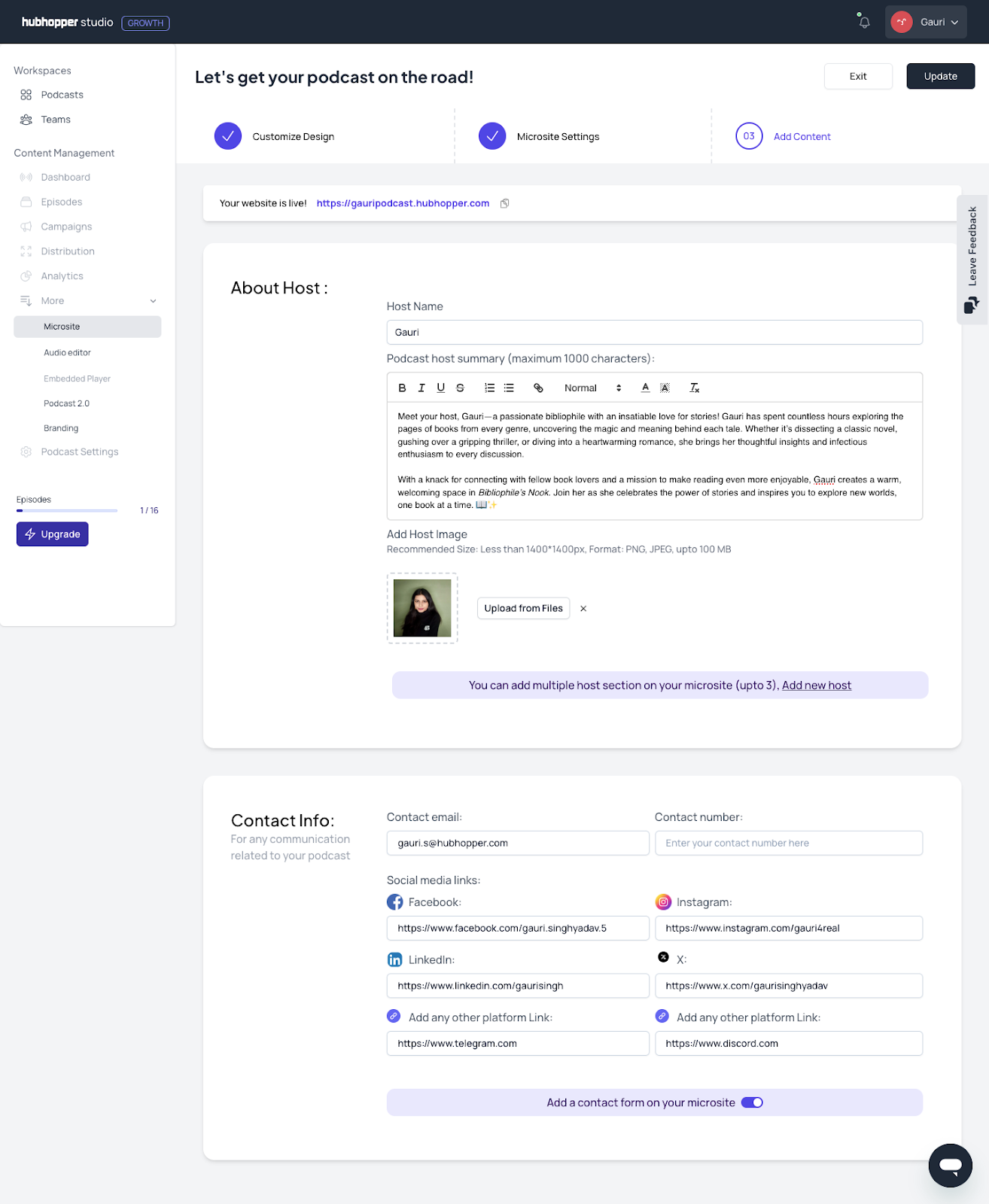
Website Up and Live
Once you’ve made the website, which will take you hardly 3 minutes, your website is ready! No coding required and you have a beautiful website on your hands. Moreover, your listeners get the choice to listen to the podcast on various listening platforms, making your podcast accessible to a large number of people.
Every time you upload a new episode, your website will be automatically updated. That means, once you put all the pieces together, you no longer have to fuss about your website anymore. Now, you can focus on your podcast and content, and leave the podcast website maintenance on Hubhopper.
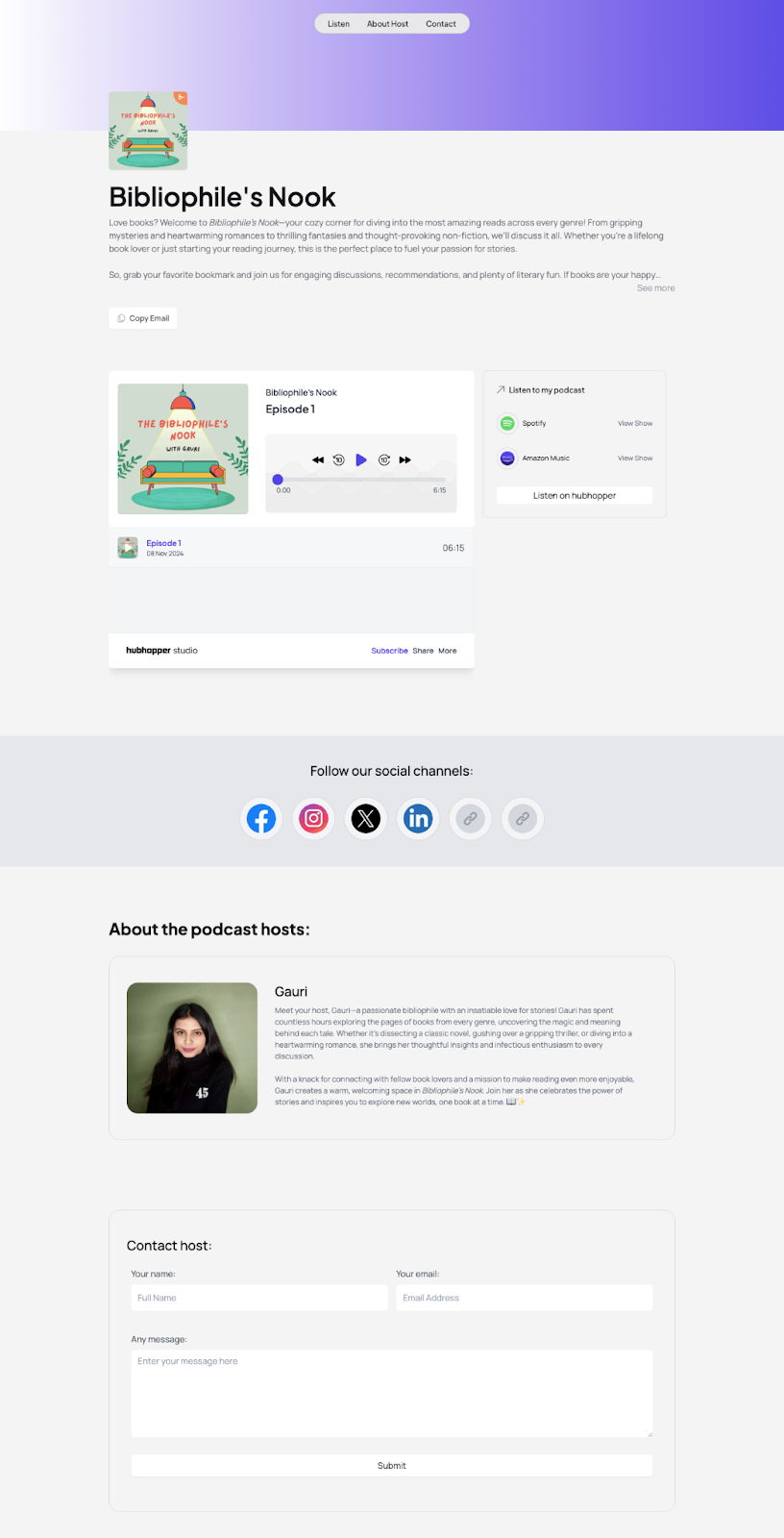
30 Best Podcast Websites Examples In 2024
- The Friday Habit’s Website
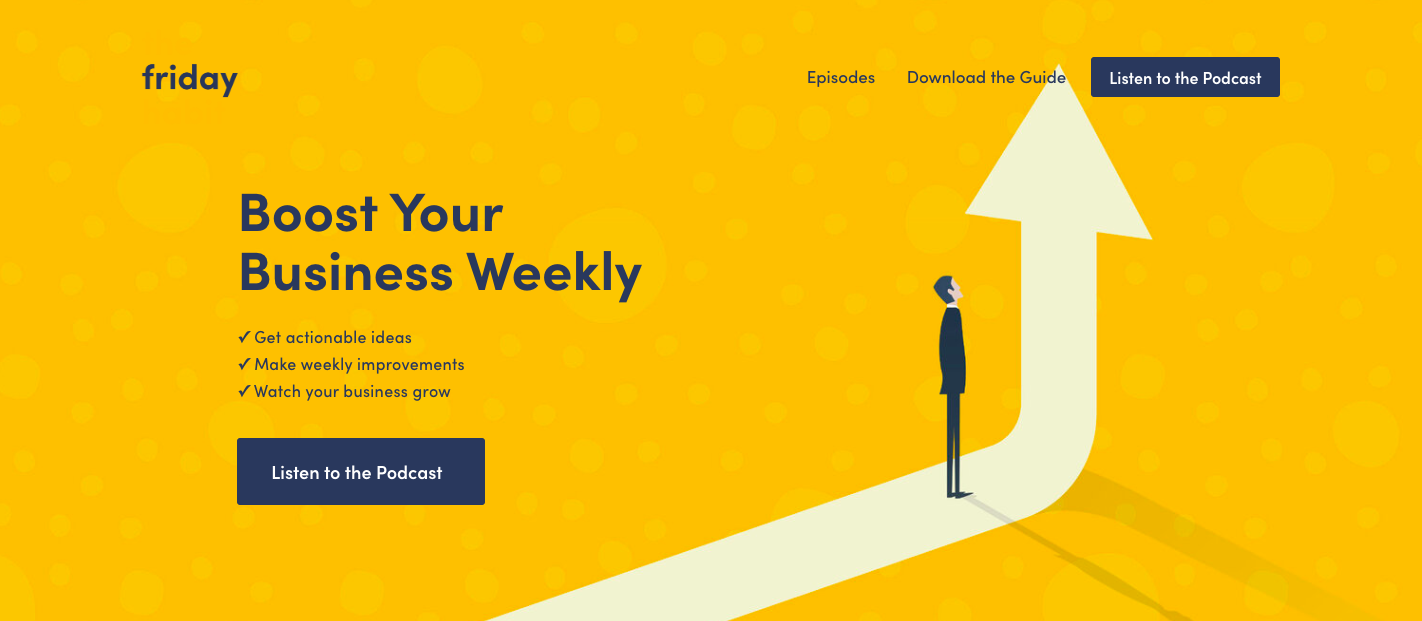
Podcast Website Built With: Squarespace
The Friday Habit’s website is simple, elegant, and clean. It tells you effectively what it wishes to deliver via its podcast and prompts you to listen to the podcast. The clean and beautiful interface with striking artwork makes it a great website inspiration for your own website.
- NewsWorthy’s
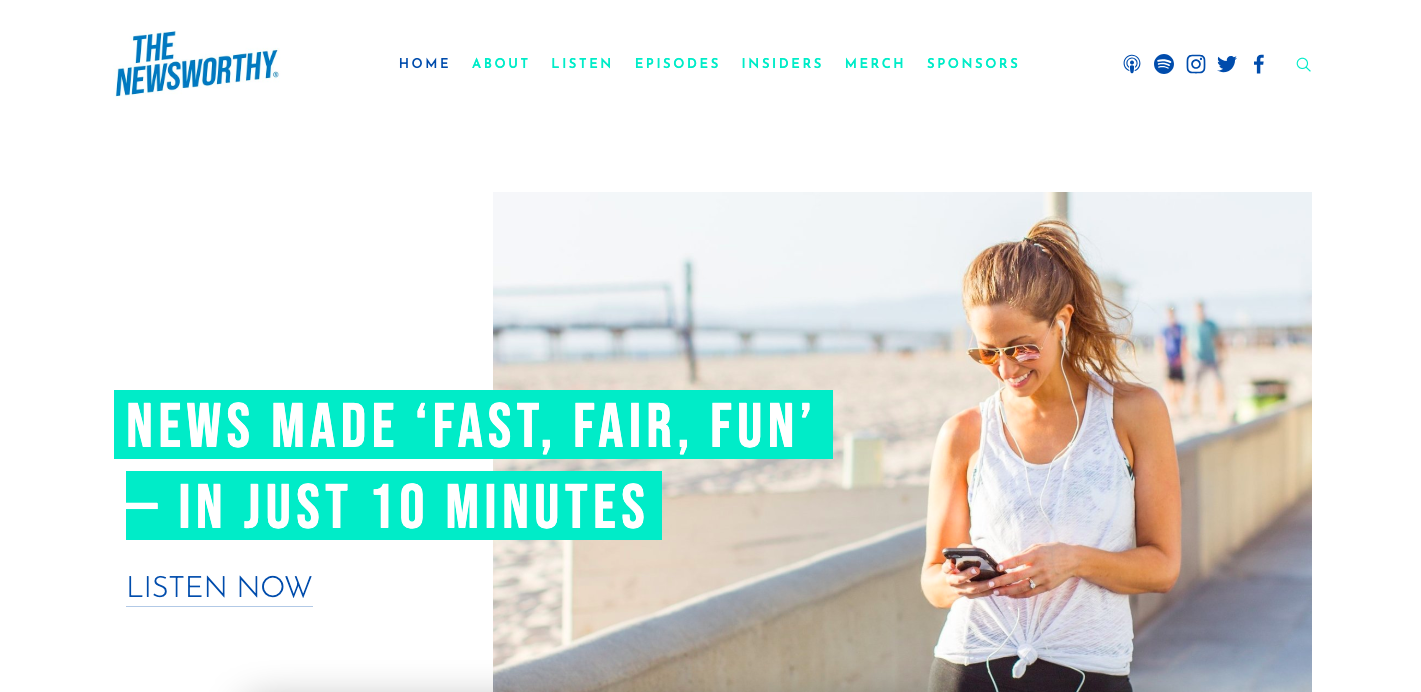
Podcast Website Built With: Squarespace
The Newsworthy is another website you can look up to for inspiration. The value proposition of their website is clear and short. The CTA is very prominent and communicates exactly what they want their website visitors to do. Moreover, the colour scheme they’ve chosen for their website matches their brand and podcast’s scheme, which is important for brand cohesion.
- CEO Anonymous With Purdeep Sangha
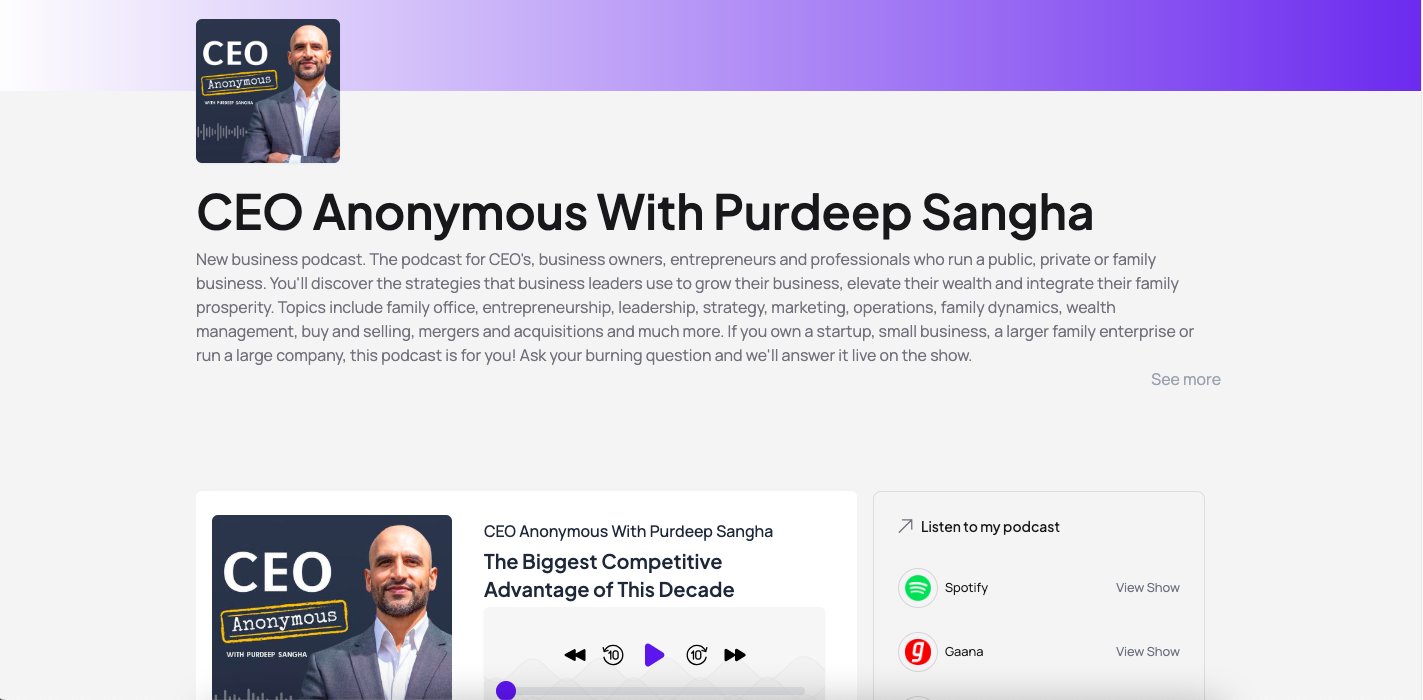
Podcast page built with: Hubhopper
CEO Anonymous podcast’s messaging is straight to the point. This suits the genre of the podcast it is in – business. The tonality is bang on and tells you who the podcast is for, what the audience will get when they tune in, and the topics covered. They’ve also opened a line of communication with their listeners urging them to ask them questions and answering them on the podcast.
Moreover, the embed player is right there for you to tune in ASAP, and if you want to subscribe, the podcast platforms are also available. Overall, it covers many facets that a podcast website should have and overall is a great example to get inspiration from.
- Twenty Thousand Hertz’s
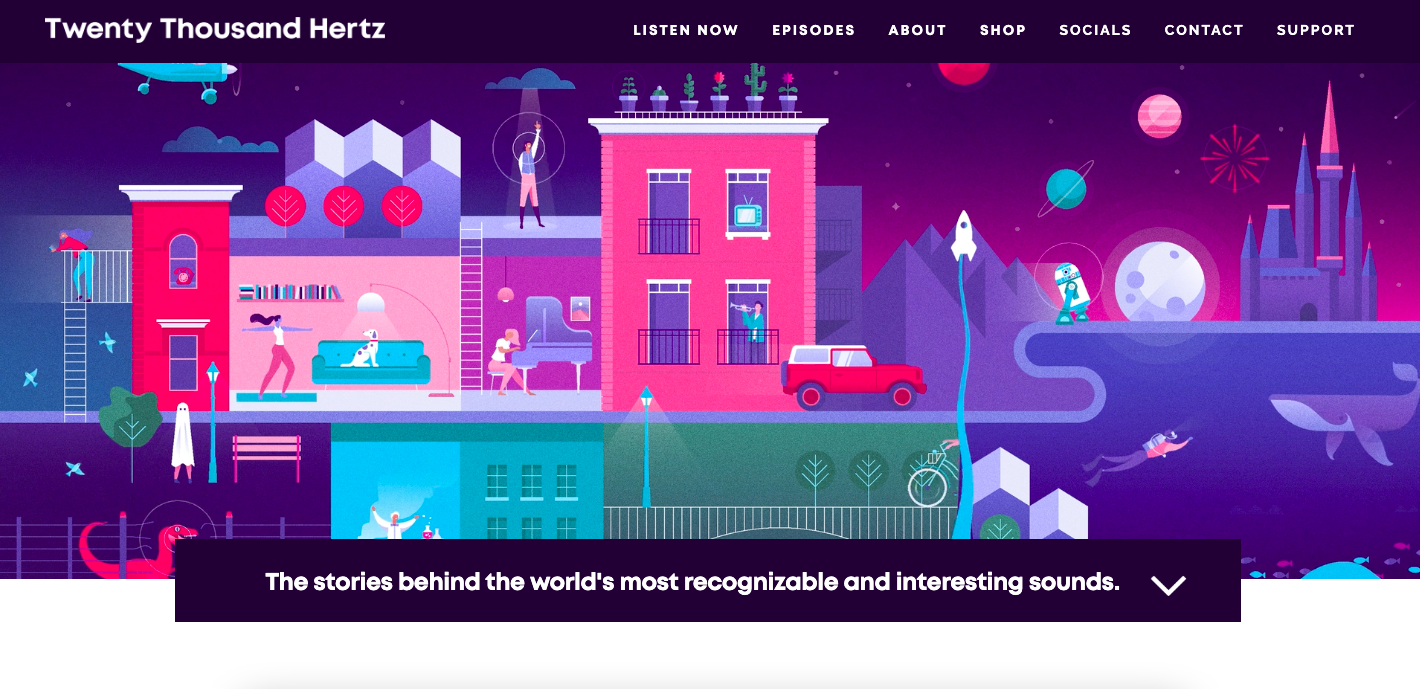
Podcast Website Built With: Squarespace
A unique podcast with a unique website. Their artwork as soon as you open the website is eye-catching and causes intrigue if you’ve never heard their podcast before.
As you scroll, you learn more about their podcast and top episodes, which is great to catch new listeners and engage loyal listeners with their favourite episodes. Their accolades section establishes credibility and the contact form at the end is great to catch any queries and requests website visitors may have.
- The WPMRR
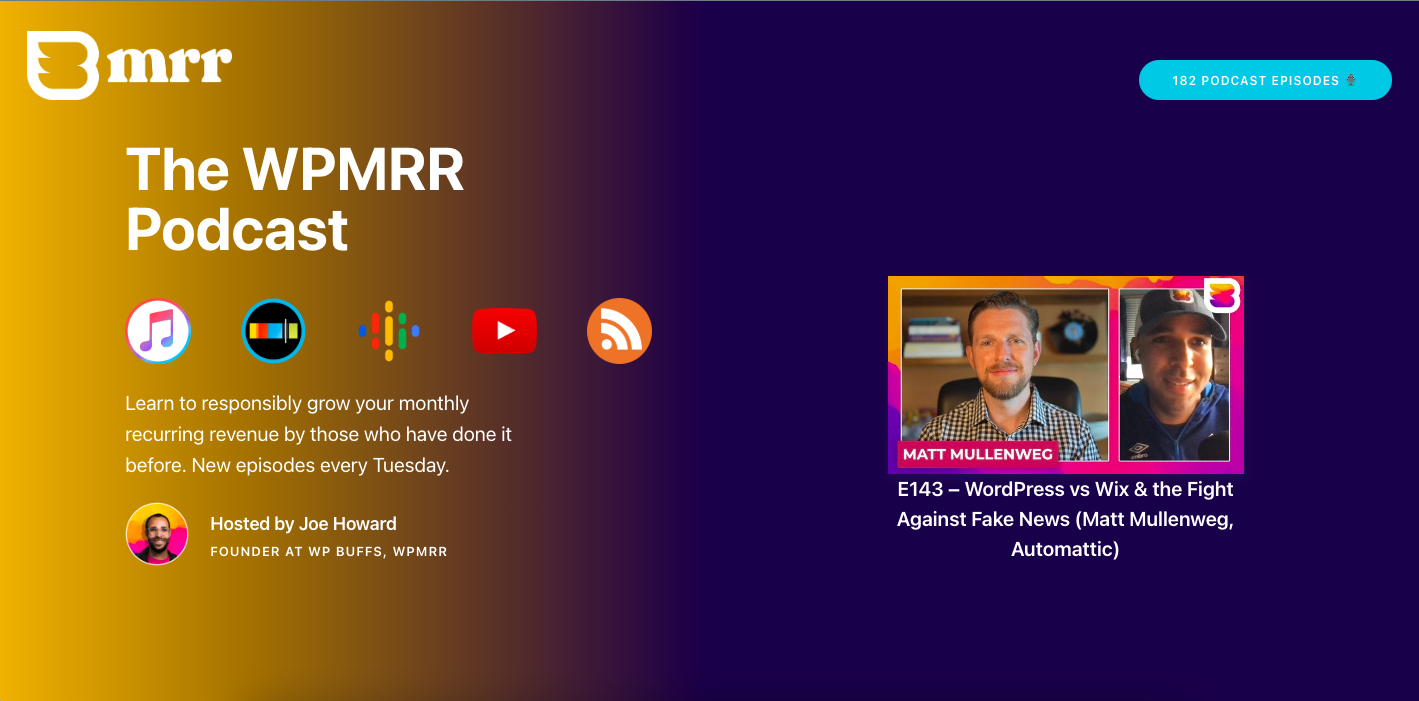
Podcast Website Built With: WordPress
The website for the WPMRR Podcast is simple and has only one objective: to get you to hear their podcast and make you a loyal listener. The value proposition is simple and straightforward, aligned with people who are their target audience.
They have also mentioned their uploading frequency, and have links to various platforms you can listen to their podcasts on. The rest of the page focuses on giving you transcripts of various episodes, making the podcast accessible to people. If you also have a similar straightforward approach in your podcast, this is a good website to get inspiration from.
- The Gabby Bernstein

Podcast Website Built With: WordPress
Gabby Bernstein is a spiritual teacher and thus her podcast revolves around spirituality. The website is very clean and easy to navigate, the only downside is no information about the host or the podcast, which can be perplexing for new visitors who don’t know about her. However, the website is focused on just the podcast and has episodes bifurcated in categories, making it uber simple to listen to episodes on topics of your interest.
At the end, there is a form to subscribe to the newsletter, prompting visitors to subscribe and stay tuned. Newsletters are a great way to engage your subscribers and inform them of new episodes.
- Ambient Daily
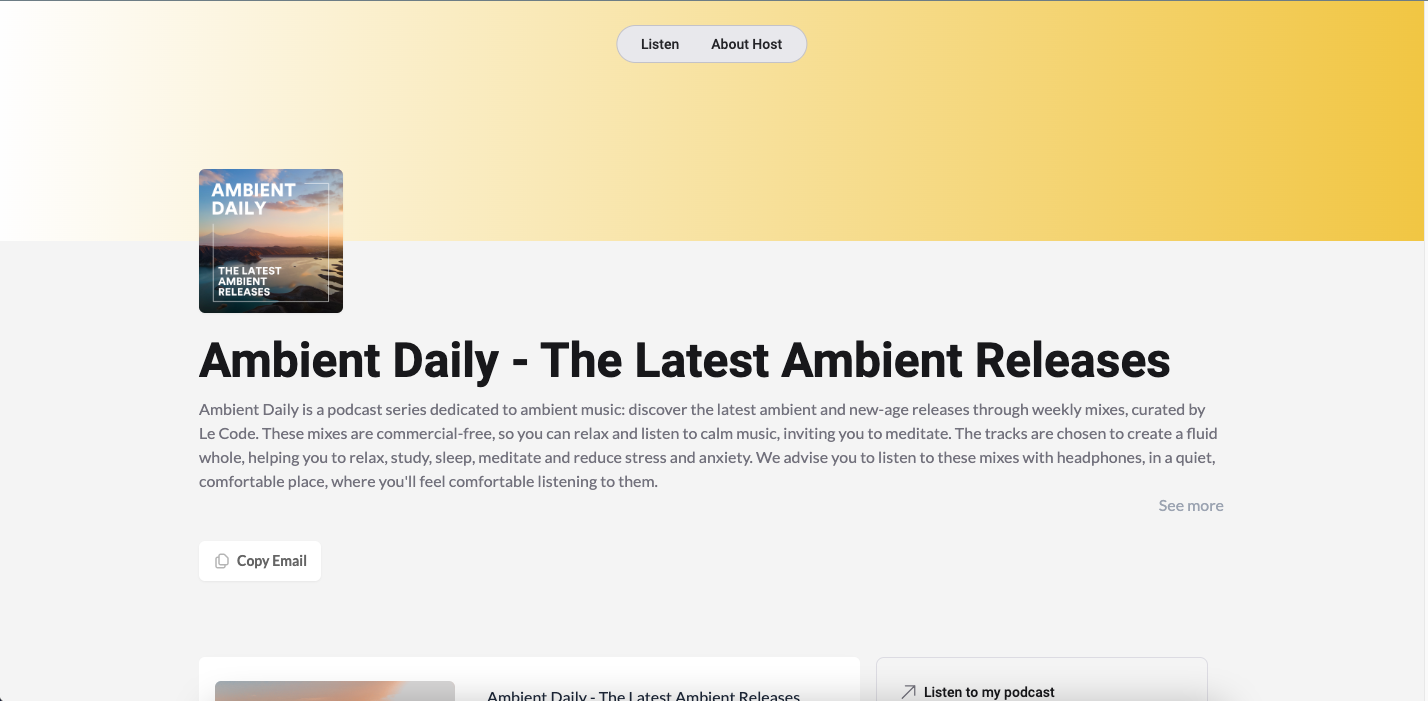
Podcast page built with: Hubhopper
Ambient Daily is a podcast dedicated to providing calming background noises for your meditation, or a peaceful evening. With this website you get to know exactly what the podcast has to offer making visitors clear what the transaction that is going to take place when they tune in.
Most podcasters face the problem of not receiving feedback from their listeners. Having the ability to display your email, solves that problem. Overall, the website gives you ample information about the podcast and also a means to reach out to the podcast hosts. The clean and minimal look is great and the fact that you can customize it anytime you want is an added bonus.
- Duncan Trussell Family Hour
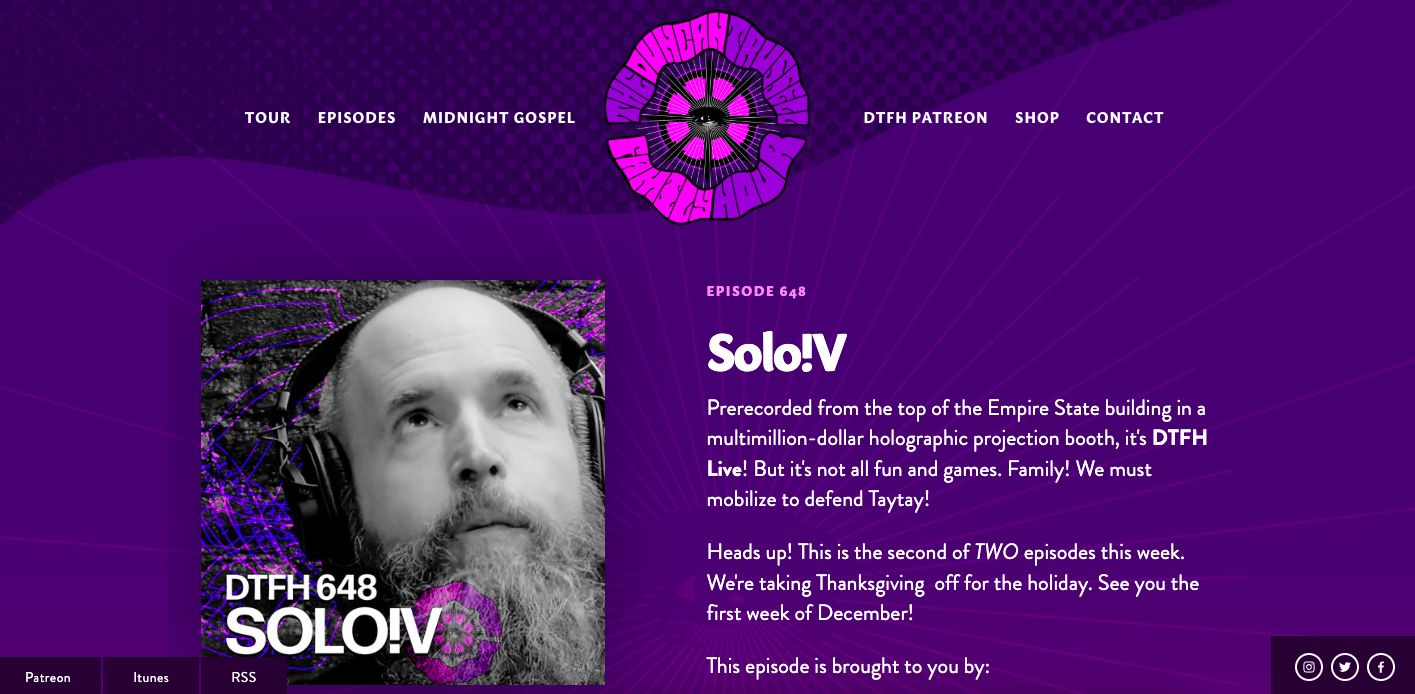
Podcast Website Built With: Squarespace
Striking visuals. That’s one thing that hits you when you come across this podcast’s website. Apart from that, its user-friendly interface lets you listen to the episode, so you can directly hear the podcast, no need for introductions.
Moreover, the website acts as a catch all hub to capture patronage, sell merch, and announce tour information. Overall the website is a great example of building a brand as a podcaster and giving all the information necessary to the listeners, new and old alike.
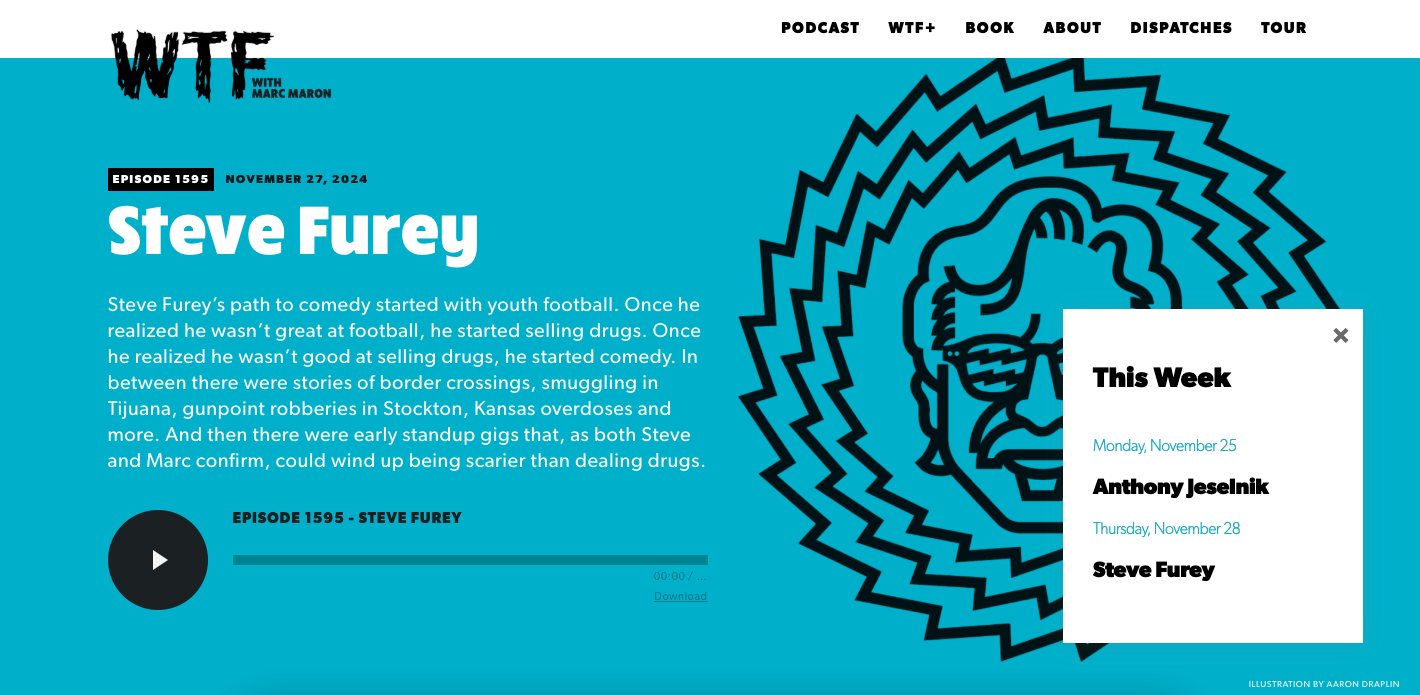
Podcast Website Built With: Squarespace
As this podcast is driven by Marc Maron, using him as the artwork on the website builds recall and strengthens the brand he is building with his podcast. A podcast player right at the start helps his visitors get reeled into his episodes. This is a great example for people who are using their podcast as a branding and positioning tool, and the website plays a larger role in tying it all together.
- The Popcast with Knox and Jamie
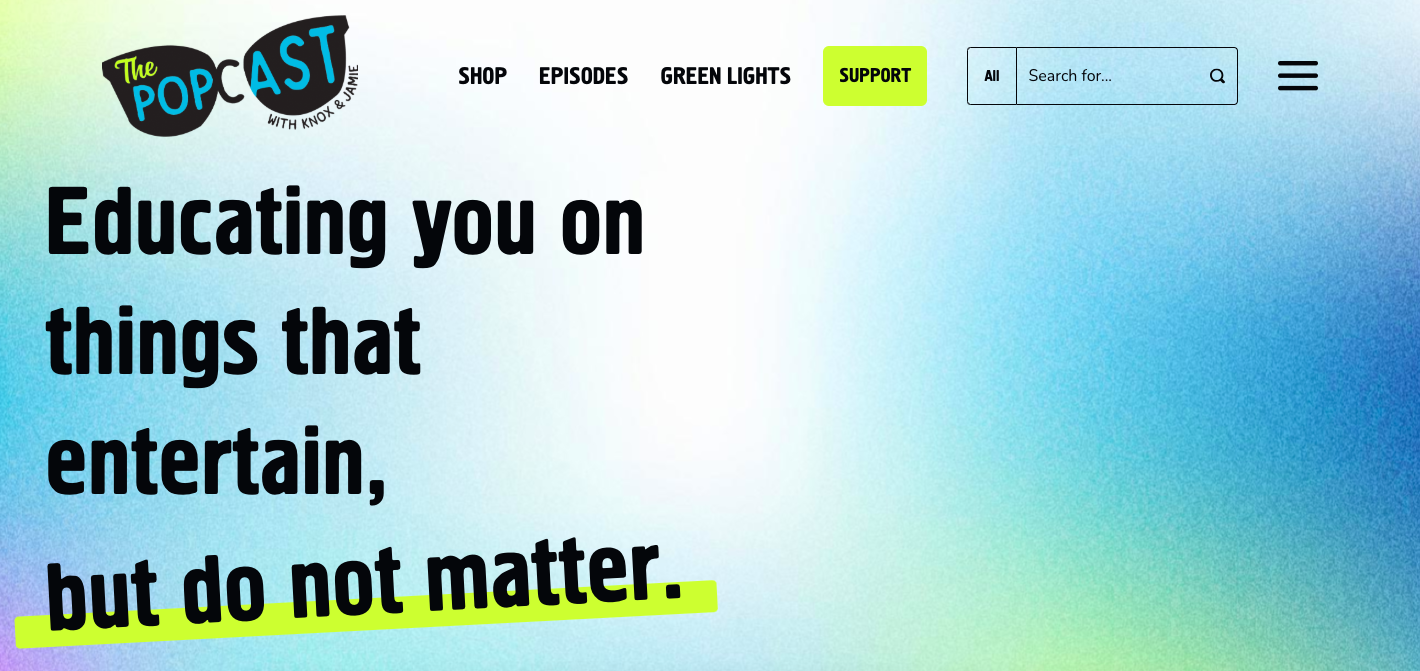
Podcast Website Built With: WordPress
The Popcast Podcast’s website fits the vibe and the message is quite clear. It takes a spin on what podcasts are being used for – education – and challenges it with the notion that their podcast is light-hearted. Even the color theme of their website matches the easy going feel.
They’ve also placed the link to their merch shop in the top menu. Many podcasters in the entertainment genre use merch as a monetizing means and thus highlighting that, also supports their podcasts website. Overall, they’ve hit the mark with their messaging, color theme, and the placement of their merch shop.
- Laura Dawn
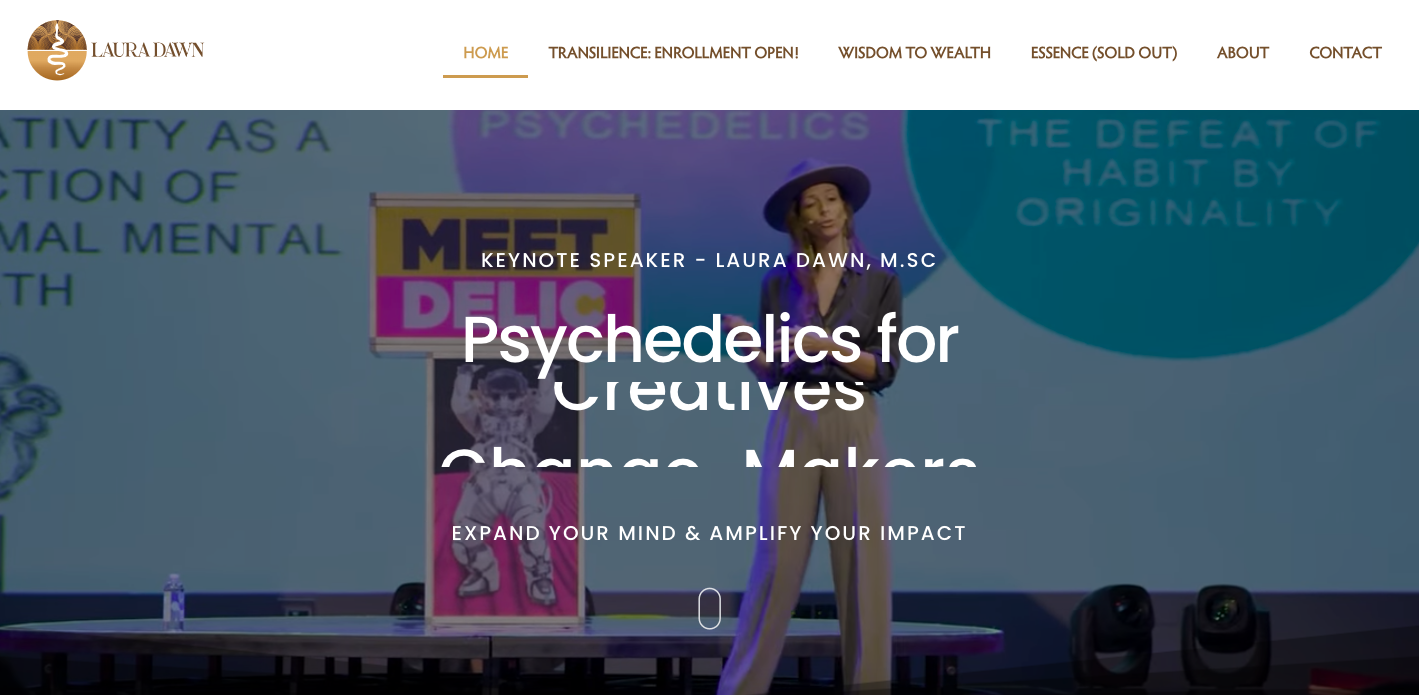
Podcast website built with: WordPress
Laura Dawn’s website is a great example of streamlining her business and podcast website in one. While it seems like a normal website to promote her programs and courses, however, as you scroll you see her podcast episodes featured right on her home page.
Moreover, her podcast’s availability on different podcast streaming websites as well as her podcast’s iTunes reviews are placed strategically to build trust. It not only draws her visitors to her podcast but the podcast strengthens her business while building trust. Combining your business website and podcast website when done right can increase the impact on both and complement each other.
- Shift
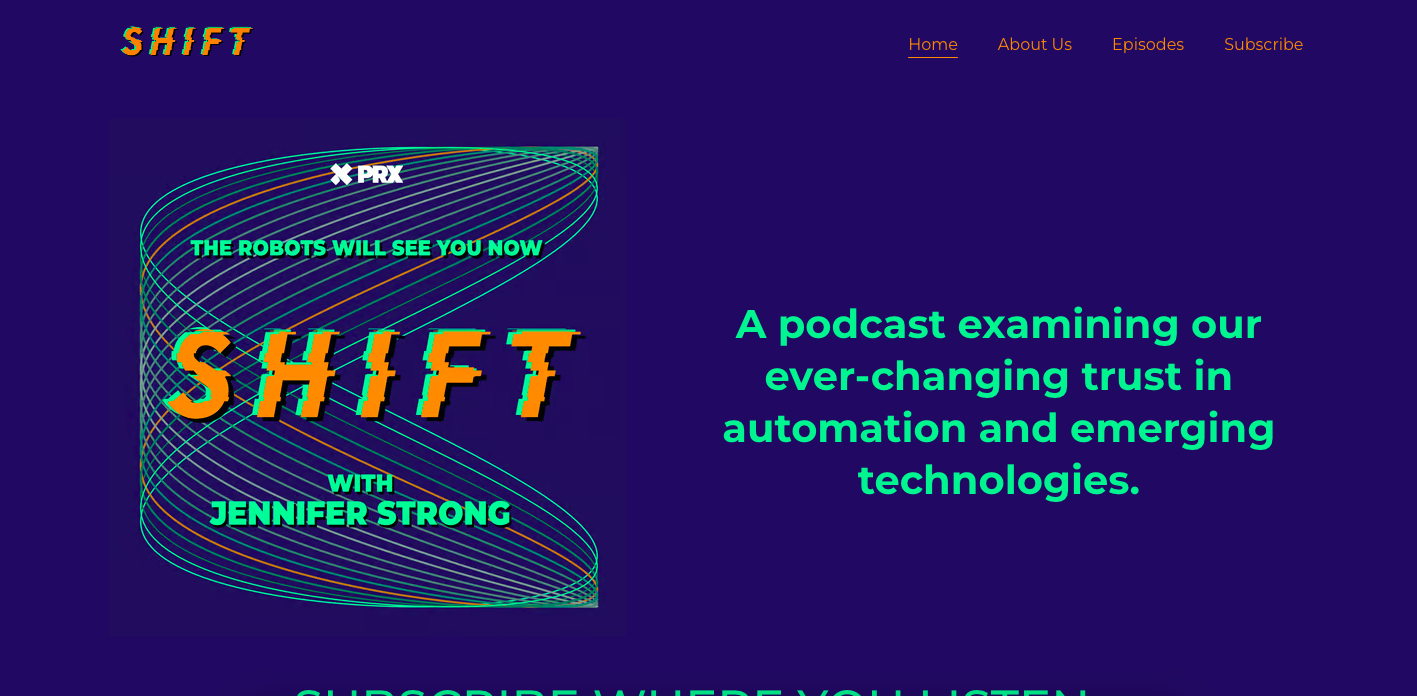
Podcast website built with: Hostinger
Shift is a podcast placed in a tricky niche – technology. Technology podcasts need high subject matter expertise and also a very super niche since technology is pretty vast. Shift’s podcast website nails some of the key things – messaging, color theme, and graphics.
The messaging is clear from the get go. It established exactly which sub-niche the podcast is in, and the color theme complements it. The blue theme is prevalent in the tech space and thus visually appeals to techies. Moreover, the graphics are clear-cut, and minimalist. Overall, this is a great podcast website example for tech podcasts.
- WTF True Stories
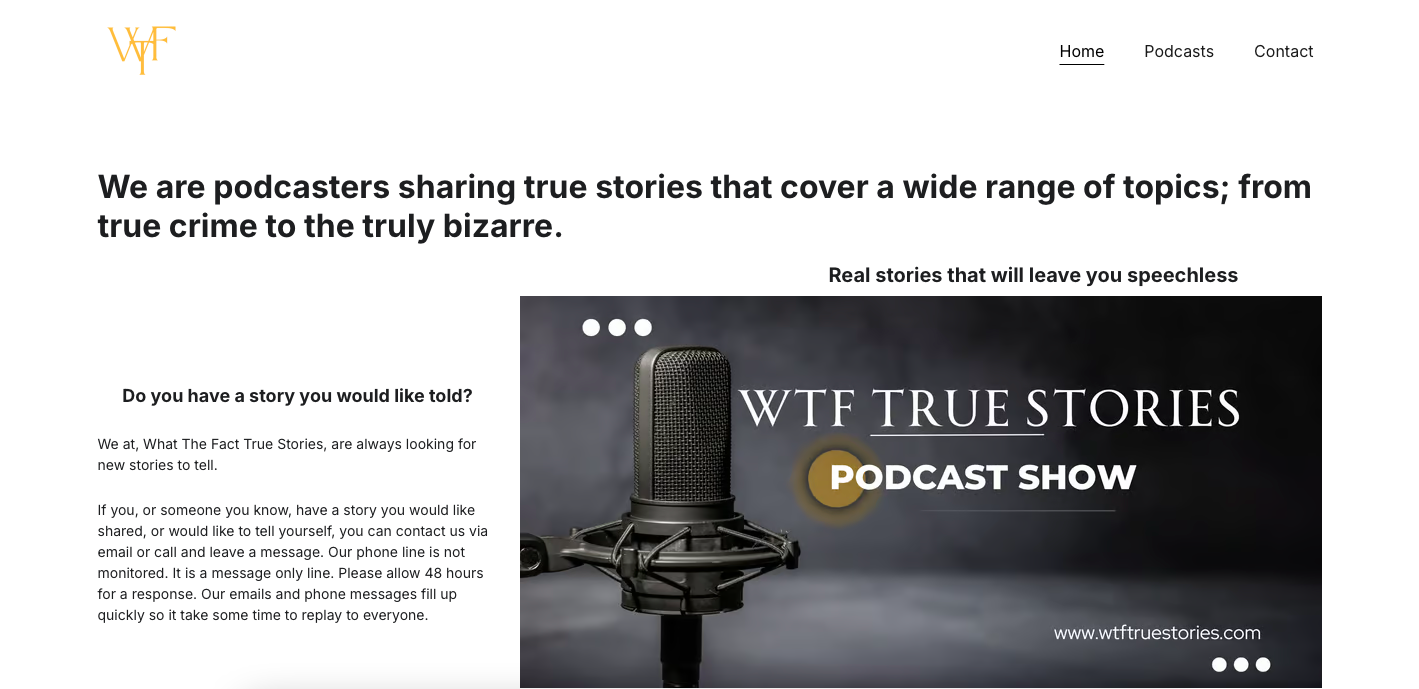
Podcast website built with: Hostinger
True crime and horror is a very popular and well-performing niche in podcasting. WTF True Stories is a podcast that combines both the genres keeping the emphasis on the stories being shared are true. Not only is it clear from their name but also their website.
Their home page focuses on not only highlighting their podcast but also on collecting true stories from their listeners. Which is a genius move because not only will they get more content and episode material but also their listeners will feel more connected to them. Using such ingenious methods also works to build a loyal audience, which highlights the effectiveness and versatility of having a podcast website.
- The Installation Art Podcast
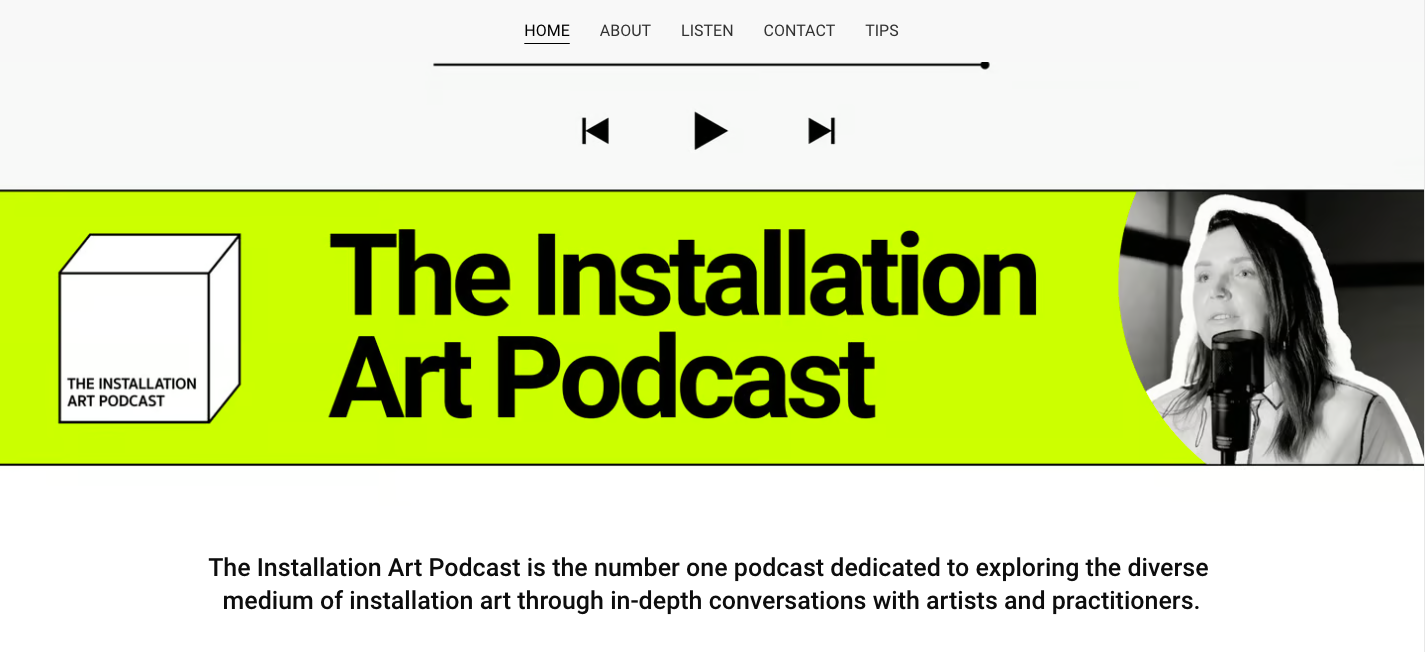
Podcast website built with: Hostinger
The Installation Art Podcast website is another example you can take inspiration from. Like discussed it has all the elements of the right podcast website – messaging, episode player, color theme and visuals. The visuals have a higher focus than the messaging but that makes sense for the niche – art. They’ve also made it clear what their podcast is about and who they’re interviewing, giving clear cut information to listeners of what they can expect.
- CTRL SHIFT
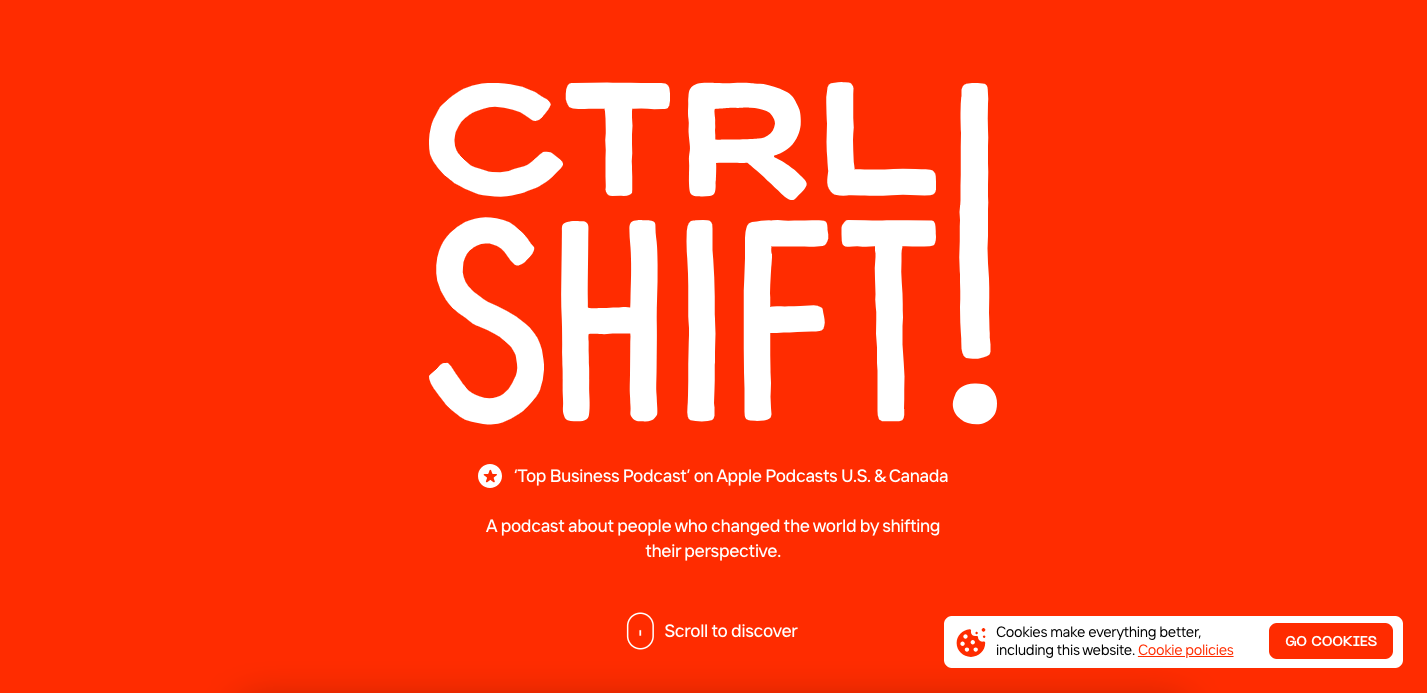
Business podcasts need to have their podcast websites. Branding and positioning is everything and if done wrong, it can set the wrong tone and detract listeners. CTRL SHIFT has done a good job with their website. It’s clean, minimal and emphasizes the podcast name.
The messaging also highlights how it is the top business podcast on Apple Podcast building trust and credibility to the website visitors. It also tells in one simple line what the podcast is about and gives you a clear call to action to explore. Overall, a job well done.
- Call Your Girlfriend
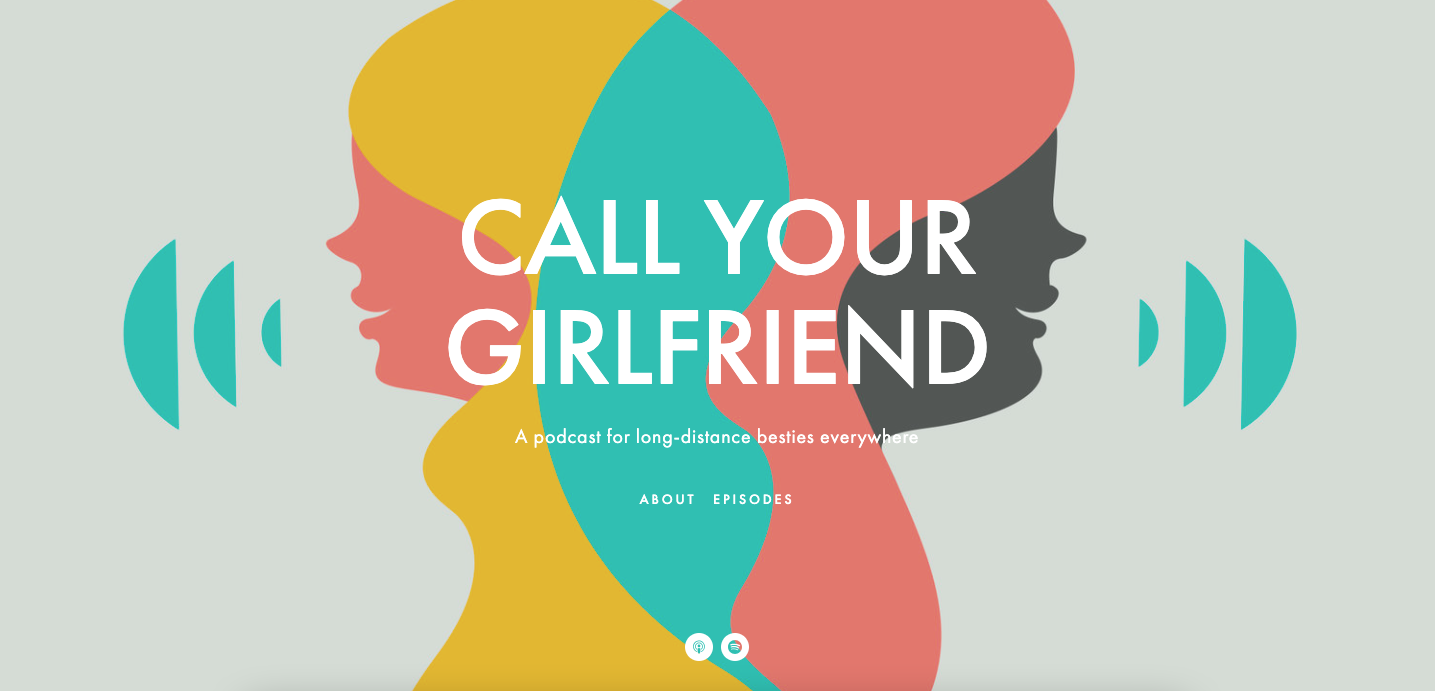
Call your girlfriend is a limited episode podcast about maintaining friendship despite the distance between you and your best friend. It is a super niche podcast for a very specific pain point that women face at one point or another.
The website for the podcast is simple and clear. The main point of the podcast has been stated and the visuals are minimal. One thing that is missing is the episode player which would have made the visitors actually have a taste of the episode. However, the website is a good example for people who want a simple website.
- Crime Junkie
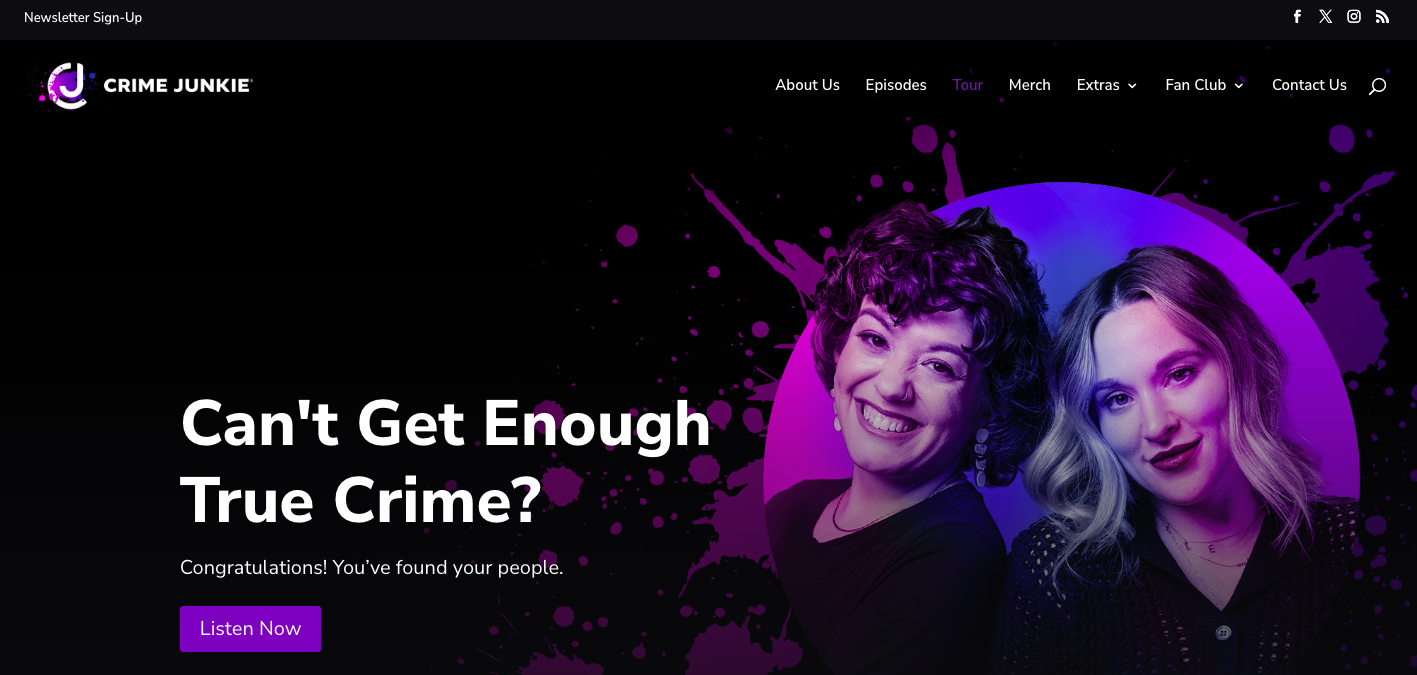
Podcast website built with: WordPress
Crime Junkie’s website is telling us two things – the hosts are front and centre and they want their audience to relate to them. With a dark theme they are matching the overall vibe of their genre as well as quick and short messaging quickly communicates what they want to – if you’re a true crime fanatic, our podcast is for you!
- Freakonomics

Podcast website made with: WordPress
Freakanomics’ website is bang on. At the beginning they let you have a taste of their podcast, through their embedded podcast player. Next their top menu bar has links to all the important places. Even their CTA is obvious, follow the show and subscribe to it. This website is made to convert new visitors to listeners and their loyal listeners to buy their book or merchandise, making their podcast monetizable.
- Office Ladies
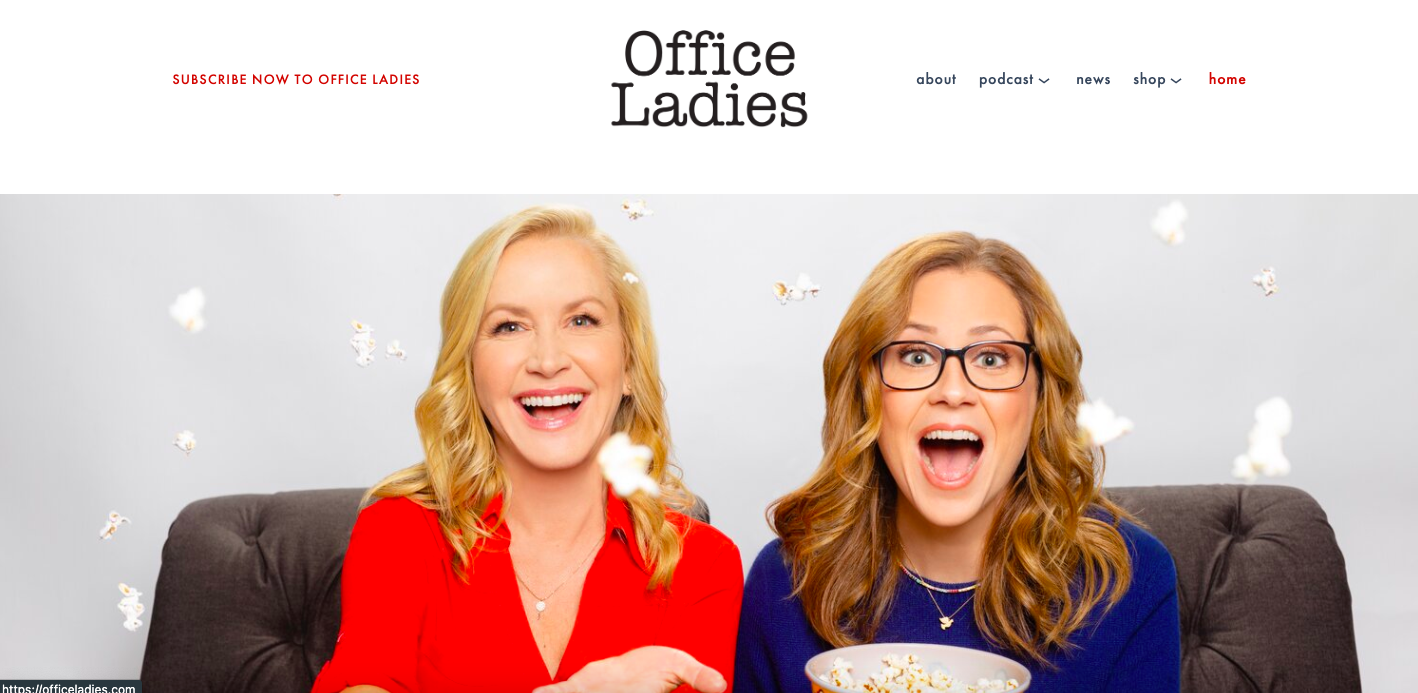
Podcast Website made with: Squarespace
Office ladies is a podcast hosted by our beloved characters in The office – Angela and Pam. Putting the hosts at the top plays capitalizes their existing clout and creates intrigue to learn more. They haven’t put any messaging or reason to listen. Why? Because they want you to explore the website more, they have done the job of creating curiosity and it’s that curiosity that will get people to listen to the podcast.
- Jay Shetty

Podcast website made with: WordPress
Jay Shetty’s podcast needs no introduction. It is one of the most top rated and popular podcasts in the space. Jay Shetty isn’t just a podcaster, he is an author, speaker, and an influential personality. So his podcast is a vital part of his personal branding. His podcast claims a prominent place on his top menu bar.
Usually, people like to keep their personal website and podcast websites separate, however, for him, since his podcast is a very integral part of his personal brand, merging the two gives him more advantage. His listeners explore his other facets, making his podcast a great top of funnel awareness.
- Emma Gannon
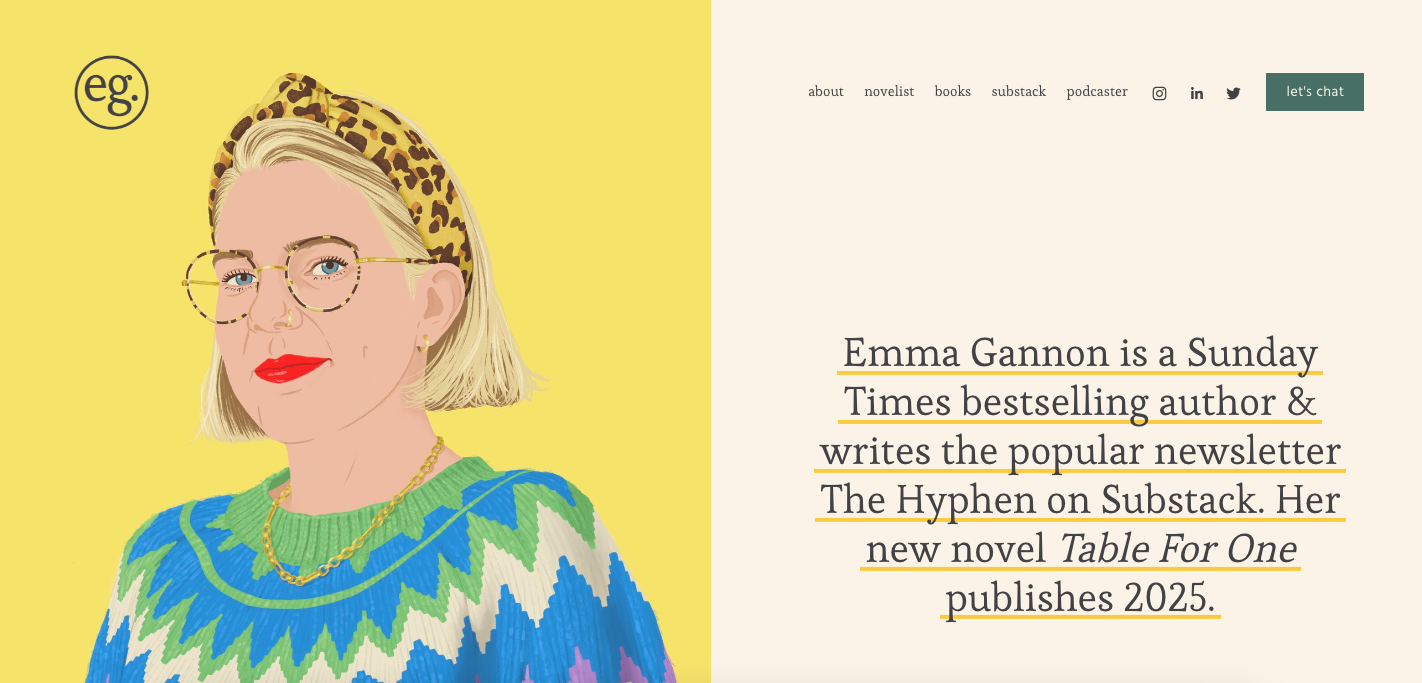
Podcast website built with: Squarespace
Emma Gannon’s website is another example of merging a personal and podcast website. Here her focus is on establishing her credibility and podcast is a tool she is using to boost that. The custom illustration adds a personal and creative touch, making the website visually engaging. The colors (yellow and blue) create a vibrant and inviting look. Lastly, the “Let’s Chat” button is prominent, encouraging interaction or inquiries.
- The Talent Campus Podcast
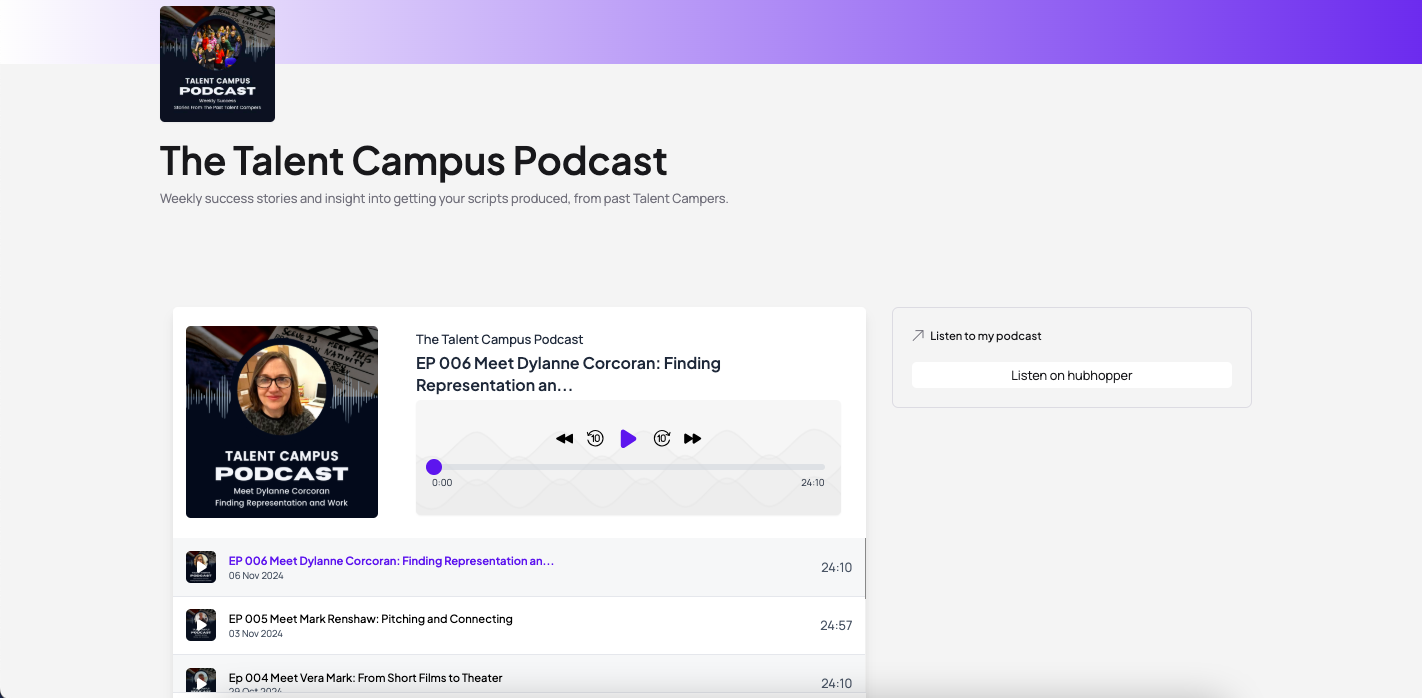
Podcast page built with: Hubhopper
The Talent Campus podcast’s website is designed to provide visitors with an immediate and immersive experience of the podcast itself. The core focus is to make the content easily accessible, which is why the embed player takes center stage on the homepage. This ensures that both new and returning visitors can quickly dive into the episodes without having to navigate through multiple pages or menus.
Conclusion
These were the 22 podcasting websites that are great to take inspiration from. These podcasts are of different genres, so whichever genre your podcast is about, you can pick a website that matches that. Moreover, mixing and matching things works great too. Three things are key when it comes to your podcast website – the messaging, the visual, and the color theme. Once you nail these, your podcast page will come about in no time.
Happy Podcasting!
FAQs On Podcast websites
A podcast on a website is basically an embedded player that you can put on your website to enable people to listen to your podcast, essentially converting website visitors to listeners who become loyal fans.
Most platforms make podcasts available for free. The top free podcast web browsers are Hubhopper, Amazon Prime, Apple Podcasts, Spotify, Castbox, and more.
To create a podcast all you need is an idea, your phone, free podcast hosting, and the right guidance. It’s easier than ever to create a podcast and if you want a step by step breakdown, here’s a blog that can help you,
Some of the best podcast websites are Jay Shetty, Office ladies, Freaknomics, Twenty Thousand Hertz and 18 more that we’ve discussed in the blog above.
YouTube is primarily a video-first platform but has become additionally a go-to place for people to listen and watch podcasts.

